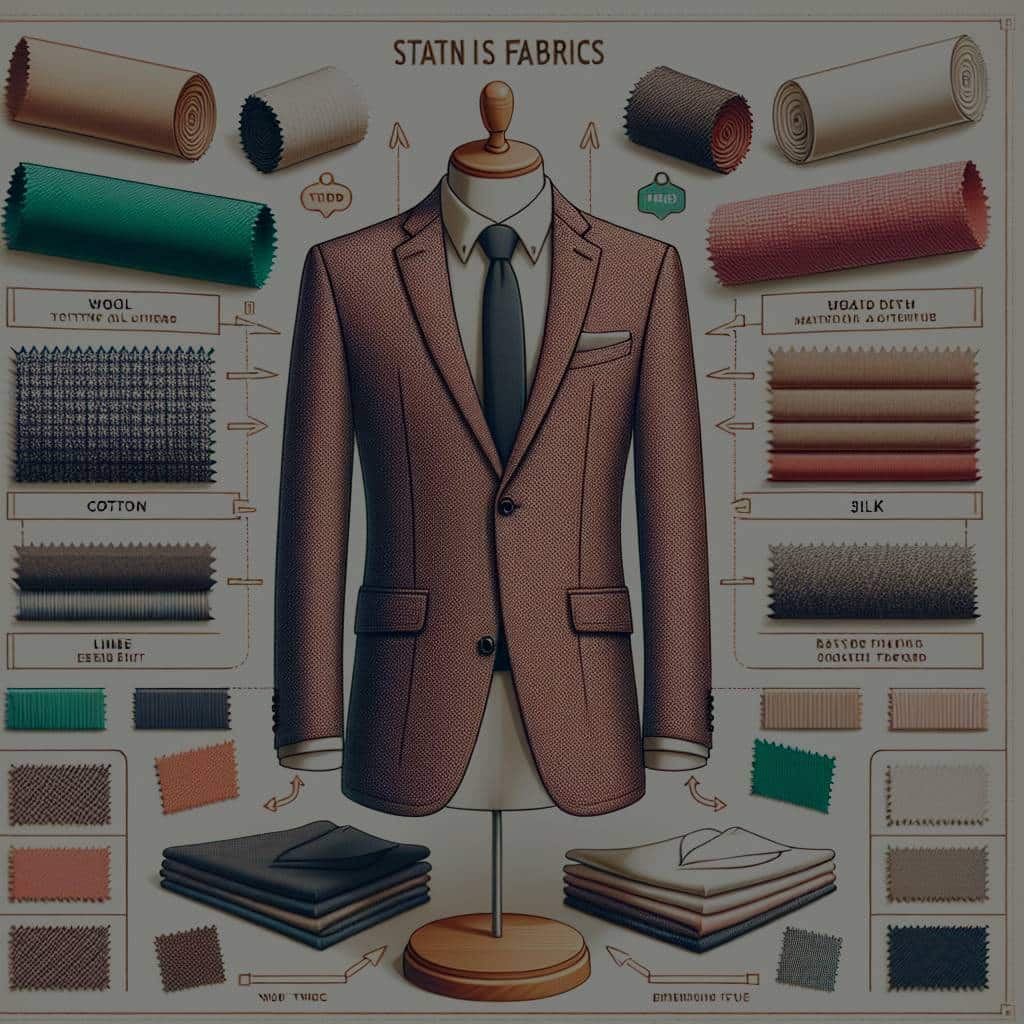How to Choose the Right Fabric for a Tailored Blazer That Keeps Its Shape All Day?

Choosing the right fabric for a tailored blazer can seem daunting at first. Yet, it’s an essential step towards a custom-made piece that exudes elegance and durability. The material you choose will determine not only the fit and style of your suit jacket, but also how well it maintains its form throughout the day. From the type of cloth, to the quality of the lining, every detail plays a crucial role. Let’s delve into everything you need to consider when selecting the perfect fabric for your next tailor-made blazer.
Decoding the Fabric Types
A blazer’s fabric is the cornerstone of its overall appearance and function. Different materials offer varying levels of durability, breathability and wrinkle resistance.
Also to read : How Can You Style a Trench Coat for a Transitional Weather Work Day?
Wool is a popular choice for blazers due to its impressive versatility. Available in different weaves and weights, wool suits both winter and summer fashion. Its natural elasticity helps maintain the shape of the coat, while the dense weave offers a fluid drape that flatters the body’s contours.
Cotton is another worthy option. While not as wrinkle-resistant as wool, cotton blazers provide exceptional comfort and breathability, making them ideal for warmer climates.
Additional reading : What’s the Best Way to Wear a Quilted Vest for a Smart Casual Office Environment?
Linen blazers, on the other hand, are renowned for their lightweight and breathable qualities, perfect for the summer months. However, linen tends to crease easily, which might not gel well with a busy schedule.
Silk offers a luxurious, soft feel with a unique sheen. However, it demands careful handling and is more susceptible to water damage.
Understanding the Importance of Lining
The lining of the blazer is as important as the outer fabric. It provides the jacket with additional structure and durability, helping it keep its shape all day.
Silk lining adds a dash of luxury to your blazer and feels smooth against the skin. However, it can be quite warm, making it less appropriate for summer blazers.
Viscose is a common choice for lining materials, prized for its breathability, silk-like feel, and affordability.
Polyester linings can be durable and affordable, but they lack breathability, making them less ideal for hot weather or those who tend to sweat.
Evaluating the Quality of the Fabric
A blazer’s elegance and lifespan are heavily influenced by the quality of the materials used. High-quality fabrics might be pricier, but they ensure excellent fit and longevity.
Look for fabrics with a smooth, clean weave without any visible defects or irregularities. The fabric should feel supple and move fluidly when draped.
Natural fibres like wool and cotton generally offer higher quality than synthetic alternatives. They breathe better, wick moisture away from the skin, and adapt well to temperature changes.
Weighing Up the Suit Style
The fabric you choose will also impact the style of your blazer. From the formality of a traditional wool worsted blazer to the relaxed elegance of a linen sport jacket, the cloth plays a big part in determining the jacket’s aesthetic and intended use.
For a professional or formal setting, a darker wool fabric would be most appropriate. For summer or casual events, lighter fabrics and colours, like beige linen or cotton, would be more suitable.
The Role of a Good Tailor
Having a good tailor is vital in the process of creating the perfect blazer. They are the ones who will expertly craft the cloth and lining you’ve chosen into a jacket that fits you perfectly.
A skilled tailor will provide valuable advice on the best fabrics to choose based on your personal style, body shape, and the intended use of the blazer. They will also ensure the fit is perfect across all areas of the blazer, from the shoulder width to the button positioning.
Selecting the right fabric and lining, considering the quality of the material, the style of the blazer, and working with a knowledgeable tailor are all integral steps towards owning a custom-made blazer that maintains its shape throughout the day. With this guide in hand, you are well equipped to make informed decisions about your next tailored blazer.
The Effects of Super Numbers on Your Fabric Choice
Super numbers, also known as S numbers, play a significant role in the quality of wool fabrics used for tailored jackets. Essentially, the super number signifies the fineness of the wool fibre. The higher the super number, the finer and smoother the fabric, but also the more delicate and demanding of careful handling.
For instance, a super 100s wool fabric is considered to be of good quality and is perfect for a custom suit that will be worn regularly. It offers a great balance of comfort and durability, making it ideal for a blazer that needs to maintain its shape all day.
On the other hand, fabrics with higher super numbers such as super 150s or super 180s are exceptionally fine and soft, making them a luxurious choice for a tailored jacket. However, they are less resilient and more prone to wear and tear, hence not recommended for daily use.
Merino wool, known for its superlative softness and breathability, is often used in high-quality wool fabrics. This material is perfect for a summer sport coat, as it offers an exquisite balance of comfort and style.
The Savile Row Difference: Why It Matters
The world-renowned Savile Row is synonymous with bespoke tailoring. A suit from Savile Row often comes with a guarantee of quality, craftsmanship, and a perfect fit. However, what truly sets Savile Row apart is its rich tailoring tradition, impeccable attention to detail, and choice of high-quality fabrics.
Wool fabrics from Savile Row are particularly sought-after. The quality wool used is often superior, offering excellent breathability, durability, and shape retention. These features are crucial in a tailored jacket that is designed to keep its shape throughout the day.
Moreover, the tailors on Savile Row are experts at creating a custom suit that fits like a glove. Whether you prefer a notch lapel, a half-lined jacket or a fully lined one, a good Savile Row tailor can create a masterpiece that suits your style and needs.
In Conclusion: Key Takeaways for Choosing the Right Fabric
Selecting the right fabric for your tailored blazer involves many considerations. Key among them is understanding the different fabric types and how they affect the jacket’s durability, breathability, and wrinkle-resistance. Wool fabric, owing to its versatility, is a popular choice, while cotton and linen fabrics offer exceptional comfort, especially in warmer climates.
The quality of the fabric also plays a huge role. Look for smooth, clean weaves and consider opting for natural fibres like wool or cotton that offer breathability and adapt well to temperature changes. Don’t forget that the super number can guide you in selecting the quality of wool fabric.
Finally, remember that a good tailor is an indispensable part of the equation. Choose a tailor who will not only craft your blazer to perfection but can also provide valuable advice on the best fabric choice, blazer style, and fit.
The lining fabric you choose is also a crucial factor. It adds to the structure and durability of your blazer, with options like silk, viscose, and polyester each offering their own benefits and drawbacks.
Whether you’re going for a sport coat for casual summer events or a classic wool worsted blazer for formal gatherings, always keep in mind your personal style, body shape, the intended use of the blazer, and the overall climate. With these key considerations in mind, you’re on your way to owning a custom tailored blazer that maintains its shape throughout the day.
